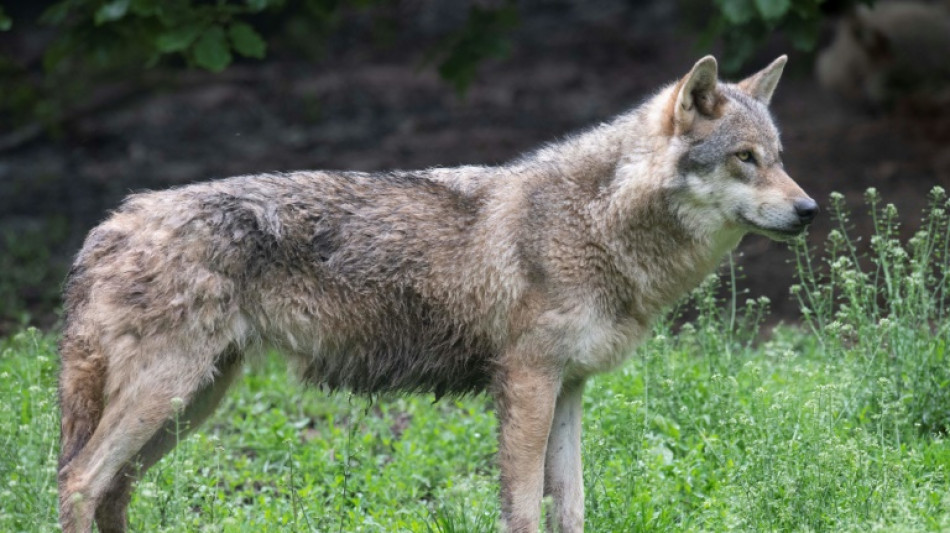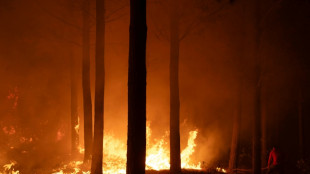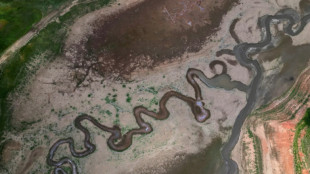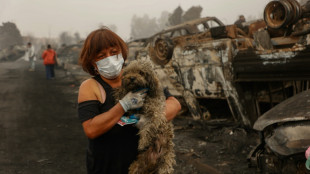
-
 Japan to restart world's biggest nuclear plant Wednesday
Japan to restart world's biggest nuclear plant Wednesday
-
South Korean ex-PM Han gets 23 years jail for martial law role

-
 Alcaraz, Sabalenka, Gauff surge into Australian Open third round
Alcaraz, Sabalenka, Gauff surge into Australian Open third round
-
Over 1,400 Indonesians left Cambodian scam groups in five days: embassy

-
 Raducanu to 're-evaluate' after flat Australian Open exit
Raducanu to 're-evaluate' after flat Australian Open exit
-
Doncic triple-double leads Lakers comeback over Nuggets, Rockets down Spurs

-
 Bangladesh will not back down to 'coercion' in India T20 World Cup row
Bangladesh will not back down to 'coercion' in India T20 World Cup row
-
Alcaraz comes good after shaky start to make Australian Open third round

-
 Trump departs for Davos forum again after switching to new plane: AFP
Trump departs for Davos forum again after switching to new plane: AFP
-
Impressive Gauff storms into Australian Open third round

-
 Dazzling Chinese AI debuts mask growing pains
Dazzling Chinese AI debuts mask growing pains
-
Medvedev battles into Melbourne third round after early scare

-
 Denmark's Andresen upstages sprint stars to take Tour Down Under opener
Denmark's Andresen upstages sprint stars to take Tour Down Under opener
-
Turkey's Sonmez soaks in acclaim on historic Melbourne run

-
 Sheppard leads Rockets to sink Spurs in Texas derby
Sheppard leads Rockets to sink Spurs in Texas derby
-
Sabalenka shuts down political talk after Ukrainian's ban call

-
 Trump's plane returns to air base after 'minor' electrical issue: White House
Trump's plane returns to air base after 'minor' electrical issue: White House
-
Barcelona train crash kills 1 in Spain's second deadly rail accident in days

-
 North produces enough nuclear material a year for 10-20 weapons: S. Korea president
North produces enough nuclear material a year for 10-20 weapons: S. Korea president
-
Japan ex-PM Abe's alleged killer faces verdict

-
 Climate change fuels disasters, but deaths don't add up
Climate change fuels disasters, but deaths don't add up
-
Stocks stable after tariff-fuelled selloff but uncertainty boosts gold

-
 What growth?: Taiwan's traditional manufacturers miss out on export boom
What growth?: Taiwan's traditional manufacturers miss out on export boom
-
'Super-happy' Sabalenka shines as Alcaraz gets set at Australian Open

-
 With monitors and lawsuits, Pakistanis fight for clean air
With monitors and lawsuits, Pakistanis fight for clean air
-
Sabalenka sets up potential Raducanu showdown at Australian Open

-
 Chile president picks Pinochet lawyers as ministers of human rights, defense
Chile president picks Pinochet lawyers as ministers of human rights, defense
-
Osaka says 'I'm a little strange' after Melbourne fashion statement

-
 UN report declares global state of 'water bankruptcy'
UN report declares global state of 'water bankruptcy'
-
Trump heads for Davos maelstrom over Greenland

-
 Ukraine's Oliynykova wants Russian, Belarusian players banned from tennis
Ukraine's Oliynykova wants Russian, Belarusian players banned from tennis
-
Kasatkina cannot wait to be back after outpouring of Melbourne support

-
 Chile blaze victims plead for help from razed neighborhoods
Chile blaze victims plead for help from razed neighborhoods
-
Russian minister visits Cuba as Trump ramps up pressure on Havana

-
 World order in 'midst of a rupture': Canada PM Carney tells Davos
World order in 'midst of a rupture': Canada PM Carney tells Davos
-
Senegal's 'historic' AFCON champs honoured with parade, presidential praise

-
 Audi unveil new car for 2026 Formula One season
Audi unveil new car for 2026 Formula One season
-
Man City humiliated, holders PSG stumble, Arsenal remain perfect

-
 Vinicius, Real Madrid need 'love' not whistles: Bellingham
Vinicius, Real Madrid need 'love' not whistles: Bellingham
-
Late Suarez winner stops Champions League holders PSG in Lisbon

-
 Frank seeks Spurs 'momentum' after beating Dortmund
Frank seeks Spurs 'momentum' after beating Dortmund
-
Jesus' 'dream' brace at Inter fires Arsenal into Champions League last 16

-
 US regulator appeals Meta's court victory in monopoly case
US regulator appeals Meta's court victory in monopoly case
-
Netflix shares fall as revenue appears to stall

-
 Tottenham beat 10-man Dortmund to hand Frank stay of execution
Tottenham beat 10-man Dortmund to hand Frank stay of execution
-
Mbappe, Vinicius help Real Madrid thrash Monaco in Champions League

-
 Men's Fashion Week kicks off in Paris with Louis Vuitton show
Men's Fashion Week kicks off in Paris with Louis Vuitton show
-
Jesus fires Arsenal past Inter and into Champions League last 16

-
 Muted anniversary: Trump marks first year back with grievances
Muted anniversary: Trump marks first year back with grievances
-
Humiliated Man City have to 'change the dynamic': Guardiola


How a lone 'immigrant' wolf revived a forest ecosystem
In 1997, a lone wolf crossed an ice bridge that briefly connected Canada with the remote Isle Royale, which lies off the coast of Michigan in Lake Superior and is renowned for its rich biodiversity.
His arrival revived the flagging fortunes of the wider wolf population, which had been hit by disease and inbreeding, and triggered cascading effects that improved the health of the overall forest ecosystem, a study in Science Advances showed Wednesday.
"Issues like inbreeding and low genetic diversity are an important concern for scientists," first author Sarah Hoy, an ecologist at Michigan Technical University told AFP.
"But this is the first study that shows when you have these genetic issues, they don't just impact the particular population and increase the risk that they will go extinct: they also have these really big knock on effects on all the other species."
- 'Old Gray Guy' -
The first wolves arrived on the island in the late 1940s, and their main prey are moose -- giving rise to the longest running study of a predator-prey system anywhere in the world.
But by the 1980s, the wolves were in trouble due to the arrival of canine parvovirus which drove their numbers down from a high of 50 to around 12.
Though the disease eventually disappeared, the population didn't recover right away. The reason was severe inbreeding, which caused lower reproductive success, as well as poorer health outcomes such as spinal deformities of the kind often seen in purebred dogs.
"If you're a wild wolf and you're having to take down prey like a moose that's eight times your size, that can make life in the wild really tough for you," Hoy said.
Enter the immigrant, identified as "M93" by scientists, but affectionately nicknamed "The Old Gray Guy."
M93 was unrelated to the existing population, and also had the advantage of being unusually large -- a big benefit when defending turf from rivals or taking down 800 pound ungulates.
He quickly became the breeding male in one of the island's three wolf packs and went on to sire 34 pups, greatly improving the genetic health of the population and the kill rate of its prey.
- Restoring balance -
Moose are voracious herbivores, consuming up to 30 pounds (14 kilograms) of vegetation a day. By reducing their numbers, the wolves helped bring the forest back into balance, which was most notable in the effects on balsam firs -- the species commonly used as Christmas trees.
With fewer moose, the trees began growing at rates not seen in decades, which is vital for the renewal of the forest and the myriad plant and animal species that depend on it.
The benefits brought by M93's arrival lasted around a decade, then the situation deteriorated once more -- ironically as a result of his extreme reproductive success.
By 2008, two years after his death, 60 percent of the wolf population's gene pool was inherited from M93, which led to a return of genetic deterioration.
M93 himself began breeding with his daughter after his mate died, and simultaneous inbreeding by other members triggered a rapid population decline until 2015, when there were just two wolves left: a father-daughter pair who were also half siblings.
Fortunately, a restoration program beginning in 2018 has once more brought balance to the system, and there are currently around 30 wolves and just under a thousand moose on the island.
For Hoy, a key takeaway is that the same principle of inserting just a small number of individuals could be applied to other imperiled predator populations that suffer from the harmful effects of inbreeding, such as lions or cheetahs, to similarly improve their ecosystems.
William Ripple, a professor of ecology at Oregon State University who was not part of the research, told AFP it was an "important study" that advances understanding "by showing that genetic processes may limit the ecological effects of a keystone species, the gray wolf."
C.Kovalenko--BTB




